New primary care physicians contribute to healthier Arizona
The Primary Care Physician Scholarship program is fulfilling its mission of reducing a critical shortage of doctors across Arizona.
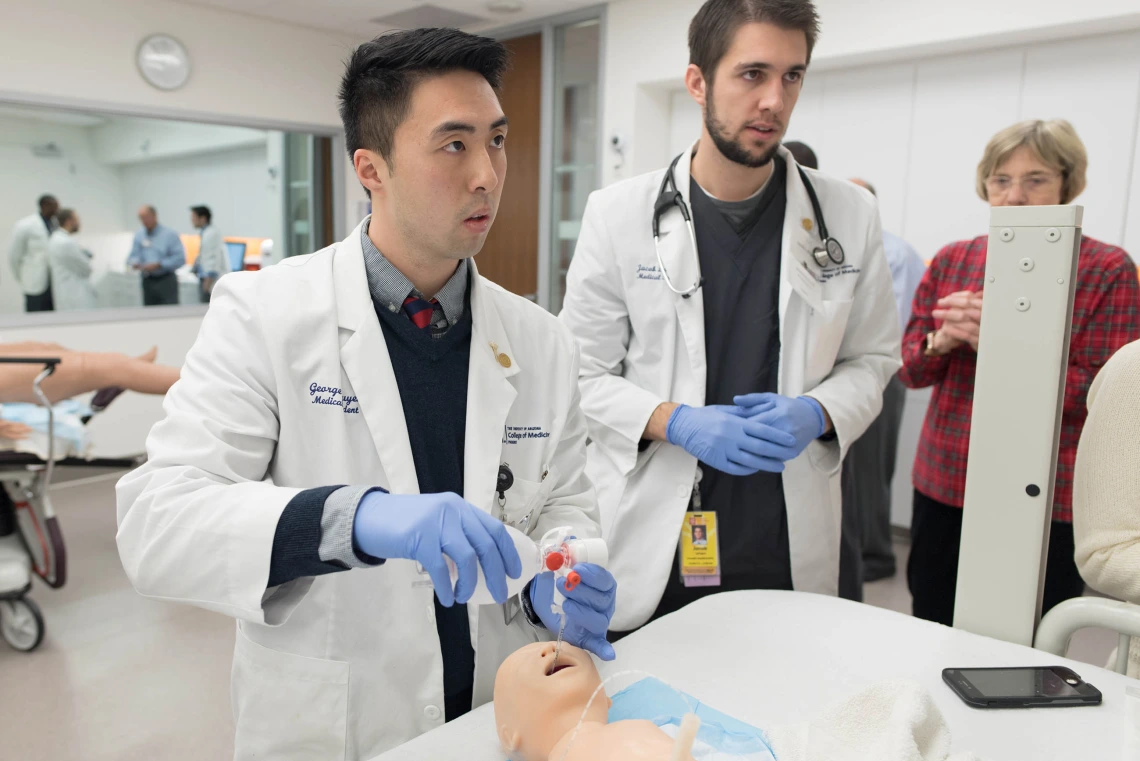
The inaugural group of Primary Care Physician Scholarship recipients included George Nguyen, MD, (left), who graduated from the University of Arizona College of Medicine – Phoenix in 2020.
In 2019, the University of Arizona Health Sciences launched the Primary Care Physician Scholarship program to alleviate an alarming shortage of primary care physicians in Arizona. Last fall, the first scholarship recipients entered the workforce as physicians, fulfilling the program’s promise of expanding access to health care in the state.
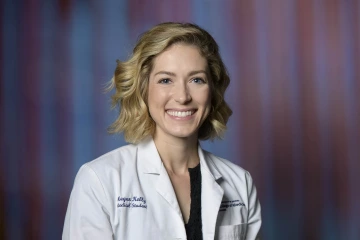
Primary Care Physician Scholarship recipient Megan Kelly, MD, is now a doctor at Neighborhood Outreach Access to Health Desert Mission Health Center, a Federally Qualified Health Center in Phoenix.
An estimated 600 primary care providers were needed to address the state’s shortage when the state legislature approved $8 million in annual funding to support scholarships for medical students. In exchange for free tuition, scholarship recipients committed to practice primary care or another designated critical-access specialty in a rural or urban underserved Arizona community.
By January of 2020, 29 students from the UArizona College of Medicine – Tucson and the UArizona College of Medicine – Phoenix comprised the first group of Primary Care Physician Scholarship recipients. Three students – Dawn Bowling, MD, Megan Kelly, MD, and George Nguyen, MD – accepted the scholarship during their final year of medical school. They all graduated, completed their residencies last summer, and accepted positions as primary care physicians in Arizona.
Watch a video of Dawn Bowling and her journey to becoming a primary care physician.
A bridge to better care
For Nguyen, the path to becoming a physician had a bridge, but not one Nguyen had to cross. Rather, it was a bridge he provided as a teenager to help his family navigate the health care system.
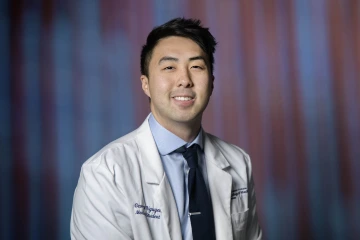
Primary Care Physician Scholarship recipient George Nguyen, MD, is now a doctor of internal medicine and a clinical assistant professor at the College of Medicine – Phoenix.
Nguyen grew up in Peoria, Arizona, a once-rural city that is now part of the vast Phoenix metropolitan area. His Vietnamese parents did not speak English well, which resulted in challenging conversations when Nguyen’s grandmother was diagnosed with Parkinson’s disease and dementia.
“My parents had lived in America for some time and were the main caretakers for my grandma, but they had never needed to be involved in my grandmother’s health care like this situation called for,” said Nguyen, who was in high school at the time. “And not speaking English well was another layer on top of the barriers they began to face.”
Nguyen felt inspired to become a leader within his family and took the initiative to facilitate their health care needs. His proficiency with the English language helped overcome many of the major hurdles the family faced, and that sense of service led him to broader ambitions to become a doctor.
“What I’ve realized is that my family situation is very similar to other patients and their family situations,” Nguyen said. “There are a lot of barriers that patients are not able to get through to access health care. I wanted to be a bigger part of that, and I felt like being a primary care physician was one way I could achieve that.”
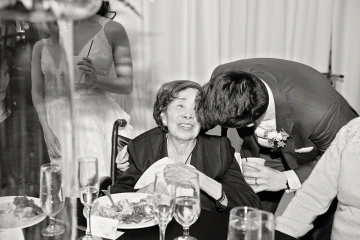
Nguyen shares a special moment with his grandmother at his wedding in 2022. He says the act of helping facilitate health care for his grandmother fueled his amibition to become a doctor.
Nguyen studied physiology as an undergraduate at the University of Arizona before graduating from the College of Medicine – Phoenix and completing a residency at Banner – University Medical Center Phoenix. He recently became an assistant clinical professor of internal medicine at the College of Medicine – Phoenix in addition to his work at Banner Health Center in Arcadia.
A pivot to a new passion
Like Nguyen, Kelly was born and raised in the Phoenix area. Her grandmother is a nurse, which fostered her early interest in taking care of people. This led her to Tucson to pursue an undergraduate degree at the Mel and Enid Zuckerman College of Public Health. She planned to get a master’s degree in public health, too, but as she progressed through her undergraduate studies, she became more interested in patient care and pivoted to medical school.
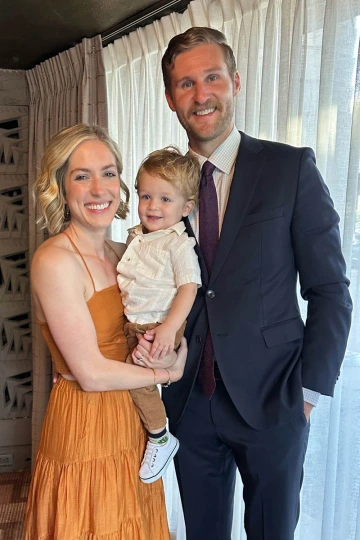
Megan Kelly, MD, was joined by her husband, Austin, and their son, Emmett, at her residency graduation held at the Arizona Biltmore Resort in June 2023.
“I realized that many of my interests in public health could have more impact in the clinical setting,” Kelly explained. “Addressing inequities in our health care system and understanding different types of patient populations is what family medicine is so passionate and focused on. So it was a pretty easy decision from there to go into family medicine.”
Kelly completed medical school at the College of Medicine – Phoenix and a residency at Banner – University Medical Center Phoenix. She was hired at the Neighborhood Outreach Access to Health Desert Mission Health Center, a Federally Qualified Health Center in Phoenix.
Kelly believes her background in public health gives her a unique perspective in understanding her patients.
“It makes me more compassionate,” Kelly said. “For me, it’s not just treating a disease and giving them a treatment plan. I understand that I need to look at the whole person and consider that they have a life outside of the four walls of the clinic, where stressors and other factors either contribute to their condition or perhaps make it difficult to pursue certain treatment path. Those are all things a primary care physician needs to take into account.”
Kelly is excited for others to follow in the path made possible by the Primary Care Physician Scholarship program.
“The more primary care physicians we have, the healthier our population can be,” Kelly said. “More physicians give more people access to the health care system. And the more access people have to their primary care physician, the easier it becomes to catch infections and diseases early. This provides better paths to treatments for patients and results in healthier populations in general.”
Related Stories
Contact
Blair Willis
UArizona Health Sciences Office of Communications
520-626-0331, bmw23@arizona.edu

